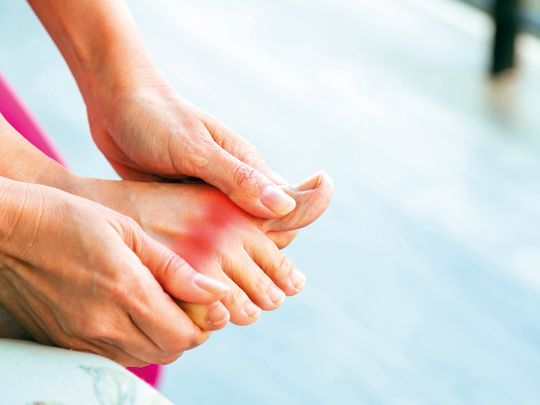
Highlight
Severe pain in your joints keeping you awake at night? Here’s what you can do
One of the widely recorded medical illnesses in history, gout has been giving sleepless nights to scores of people for ages. Characterised by severe pain in joints, often at the base of the big toe, it usually strikes in the night without any warning.
A kind of arthritis, gout is caused by the build-up of uric acid crystals. This happens when your body produces too much uric acid as it breaks down purines, substances that are naturally found in your body as well as in foods such as red meat, organ meats — livers, brains and kidneys — and some seafood. The uric acid that is not excreted by the kidneys turns into needle-like crystals in and around the joints causing pain and swelling.
“The prevalence of gout in the UAE has risen over the past 15 years,” says Dr Amit A. Shah, Specialist Orthopaedic Surgeon at Amber Clinics, Al Rigga. “Men are nine times more prone to gout than women, who tend to have lower levels of uric acid. Women usually get gout after menopause, when their uric acid levels approach that of men.”
Although a gout attack usually hits the base of the big toe, it can affect any of your joints — ankles, knees, elbows, wrists or fingers. The pain is severe in the first 4-12 hours.
“Consult your doctor even if the pain disappears,” says Dr Shah. “Gout attacks can recur unless it is treated. Over time, they can harm joints, tendons and other tissues.”
Joint fluid aspiration and analysis is the best way to confirm gout. “This common office procedure is performed with topical local anaesthesia. The fluid is withdrawn (aspirated) from the inflamed joint with a syringe and needle and then analysed for uric acid crystals as well as infection.”
Your doctor may also do a test to measure the amount of uric acid in your blood. “Medications to reduce the pain and inflammation caused by the attack as well as decrease uric acid levels in the blood are then prescribed,” he says. “This prevents the formation of urates and kidney stones.”
If your parents have gout, then you have a 20 per cent chance of developing it, adds Dr Shah. “If gout runs in the family, men in particular should limit their intake of alcohol, fats, and foods such as meat, sardines, bacon, mussels, and yeast that are more likely to increase the uric acid level in the body. Researchers have reported that meat or seafood consumption increases the risk of gout attacks, while dairy consumption seemed to reduce this risk.”
Alcohol, especially beer, can bring on an attack. “It causes gout by slowing down the excretion of uric acid from the kidneys as well as through dehydration, which precipitates the crystals in the joints,” he says. Men should also watch their weight. Obese people tend to produce more uric acid and their kidneys find it more difficult to get rid of the excess uric acid.
Drinking plenty of liquids can help prevent a gout attack. It also minimises the risk of kidney stones.
What are the signs?
Sudden severe pain in the affected joint followed by swelling, reddish colour and tenderness. Pain subsides in hours to days, with or without medication.
Affected parts
Large joint of the big toe
Ankles
Knees
Elbows
Wrists
Fingers
What puts you at risk?
Genetic disposition
Obesity or being overweight
Moderate to heavy alcohol intake
High blood pressure
Abnormal kidney function
Drugs and diseases that cause elevated levels of uric acid
Abnormally low thyroid hormone levels (hypothyroidism)











